Prior to my conversation with South African artist, Reggie Khumalo, who is as celebrated for his travels as he is for his art, I had seen his work. I was immediately struck by how profound each of them are, despite a perceived simplicity of appearance at first glance.
Reggie is like that. On the surface, he appears to be a simple person who has managed to successfully combine his passion for travelling with his love of painting. And he is this – a simple person, but one with so much depth that it would take many lifetimes to fully unravel.

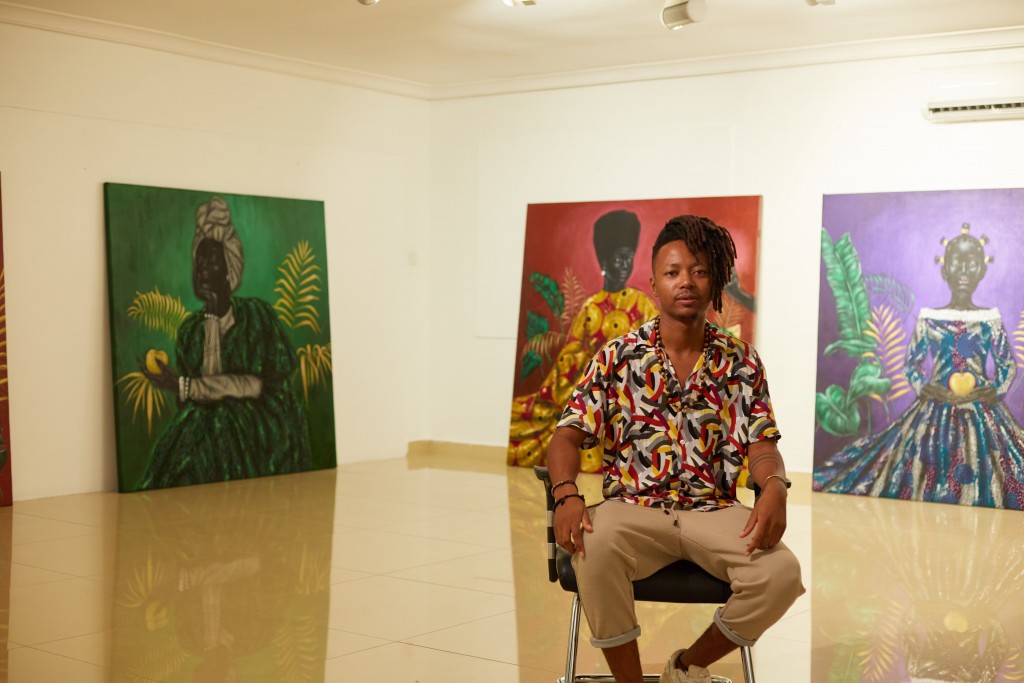
Khumalo’s travels have led him to Nigeria, where, in partnership with J.Room Curated and BrownEyedBoy Art Pursuits, he is exhibiting his current body of work. Titled Mental Revolution, it is a collection of paintings that calls for us as Africans to liberate ourselves from our painful past and compels us to usher in an Africa that knows its worth.
Ahead of the exhibition which officially opened on the 13th of April at the HourGlass Gallery in Victoria Island Lagos, we sat down to speak with Reggie Khumalo and uncover the man behind the art.

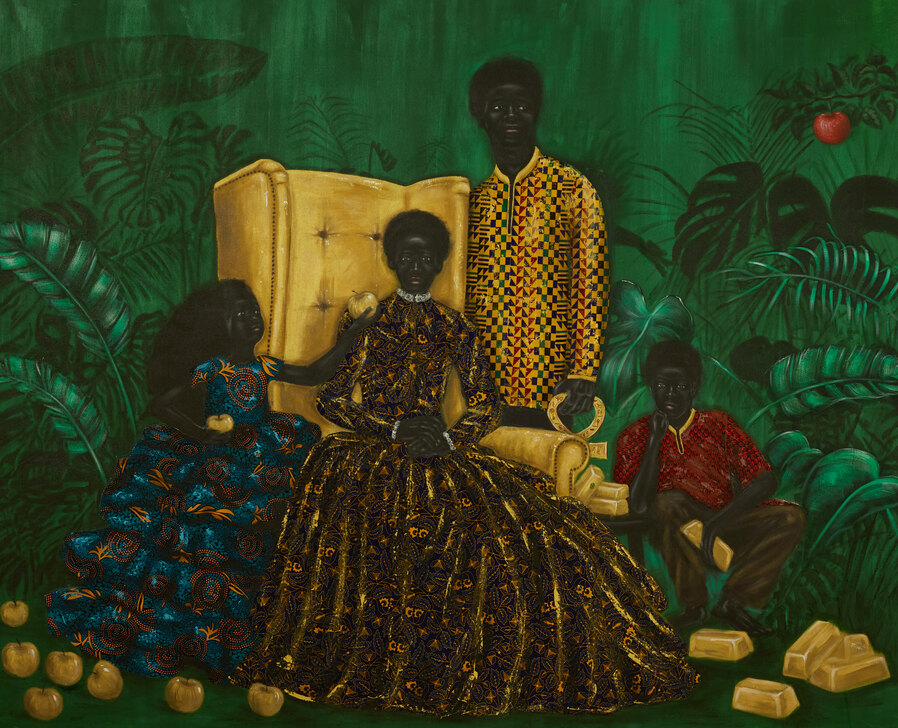
In conversation with Reggie Khumalo begins now…
(This article has been edited for clarity)
A.L.M: What inspired your travelling artist life? How did you end up combining both together?
RK: I think for me I’ve always wanted to travel, I’ve always wanted the sense of freedom because I am a motorbiker. So travelling on a motorbike across the continent was freedom; I was totally free, I had no responsibility. I had a tent, my home [and] I was prepared to be … for my home to be a tent.
So that is what truly I did. I had a tent at the back of the bike, and I said “I’m gonna just travel and I’m gonna be free.” And I didn’t expect what I received back: I didn’t expect what Africa gave back to me. I didn’t expect that love I received from Africa, and just how great of a people we are. I never expected that. I was blown away by the kindness that people gave, ehrr, showed to me, I was just blown away by the love. I cannot express it. We are just such a beautiful and unique people. They did it with humility and ehrr, you know, they were so humble about it.

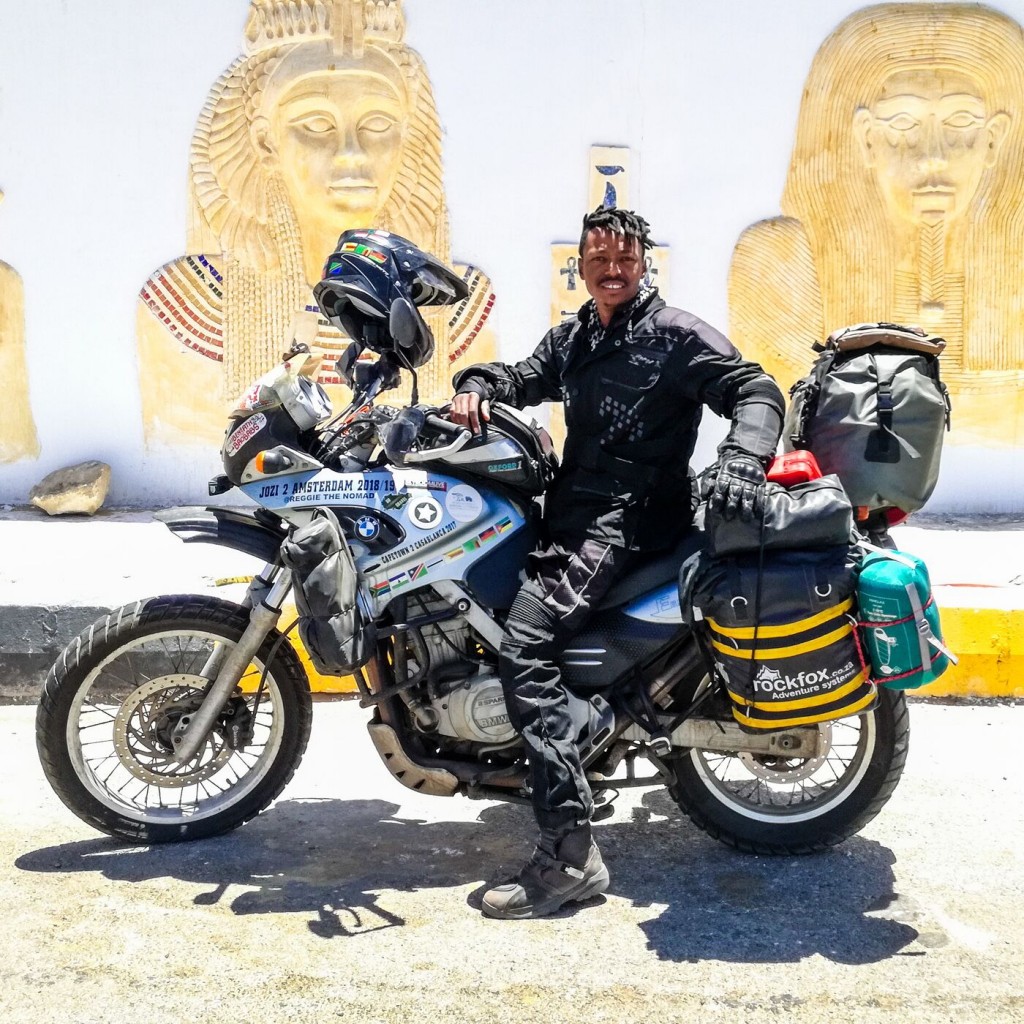
It was like “What do you expect? You’re my brother, you’re my sister.” It was always like that, like “Are you African?” “Yes, I am.” “Oh you’re my brother, you don’t have to pay here, you don’t have to worry.” And it was… and then you realise all of a sudden, ‘I am not alone.’ That changes you. And then you realise that everyone around Africa is rooting for you, everyone is for you, then every place is safe for you. And then you lose that fear of going to unknown places.
So every time I went, it was like also picking pieces of myself with every person I met. Even like meeting you is like meeting myself, you know, in a sense. Because we are one people. And that is such a beautiful experience for me.
A.L.M: And did the idea of doing art… doing exhibitions in each city you visit start from there?
RK: Yeah, yeah. So I do shows in different countries and with some of the money, I then build schools. I help take kids to schools, girls to university in South Africa and in Ethiopia I help… you know, with different things that I can help with. Because also, one of my philosophies is helping…trying to highlight what we are to the world. And I cannot say, “oh, we’re helping people, we’re caring people, we’re sharing people” if I personally don’t do that myself.

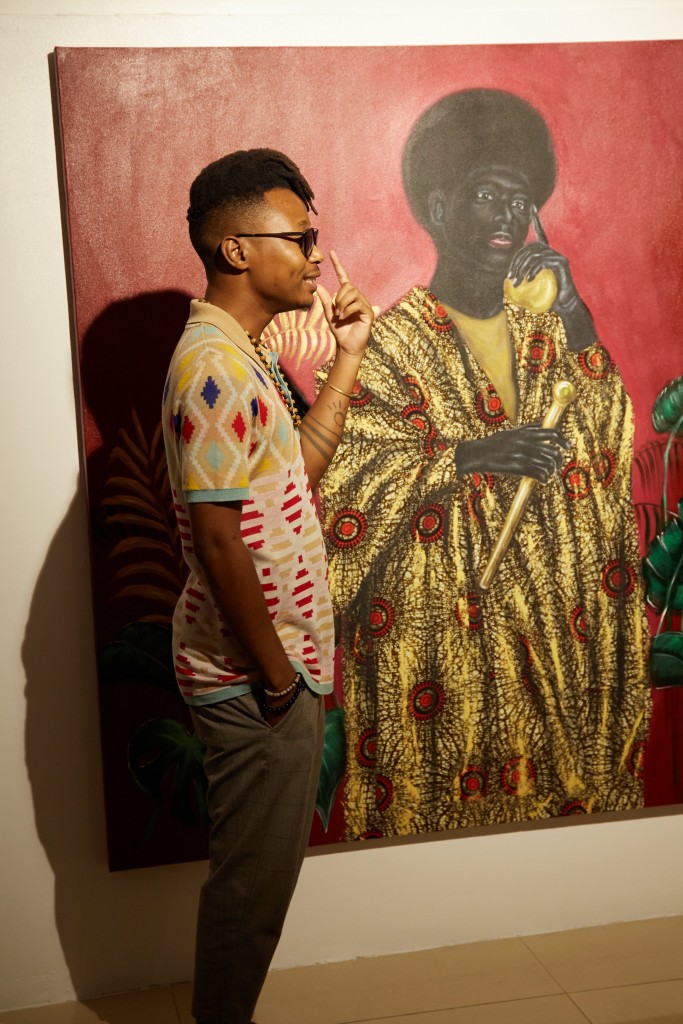
So I wanted to be the example, to say Africa is going to be rebuilt by you, it’s going to be done by you, me, I am going to be the change I mean to see.
A.L.M: I had read somewhere that you had run a gallery and done scriptwriting. What inspired your move into art?
RK: Oh, this is an old interview I guess.
Yea so … I was running a gallery, and then I was doing a whole lot of other stuff. But all that was not just me, you know, it was not just… I just never felt at home. It was not just peaceful you know. And I went through a quarter-life crisis whereby what I am trying to do is not working, whatever is going on is not working. And I had to… that’s when I did the trip.
So the trip was called The Ride and the Artist Within. (Oh, that was the one from Capetown to Cairo) Yea. (Oh, ok, so that was when you decided you were going to go into art full time?) Yea (Really?! I thought you had started doing art before that time.) No, no. So the trip was to find myself, to find the artist within myself. So I went around and I was meeting different artists, I was meeting different people and then… but I know I could always paint, I always could paint. But I just never … it was something that I was shaming, I always felt like artists were quite not taken serious.. they were looked down upon. But then I did this trip and I was like there is nothing else I want to be but an artist, you know?
And so, I just went into it. That trip, my life, totally (And you had no formal training prior?) No, no formal training. (So how did you do it?) Well, I just ehrr, I see people doing it and I do it. But then I .. from that then I start. I think that main thing was for me, to express whatever is inside. Was it right, was it wrong, it didn’t matter. So I just said I’m gonna express whatever is coming from me. And that is what I did; that’s what I’ve been doing. So somehow it has ended up being here in Lagos, it has ended up being in Europe in the States, in being wherever. So now, I’m here, and that has been the journey. It’s just allowing myself to express and believing in that expression that it’s meant for someone’s ears, it’s meant for someone’s eyes, it’s meant for something.
A.L.M: If you were not doing art, if you were not painting, what would you have been doing? What other career path would have appealed to you?
RK: If I was painting, I would have died. (Literally,) I would have died. I just don’t see how else you can be something else you’re not meant to be. Either I’ll be on a motorbike, I’ll be travelling on motorbikes across continents and yeah, cos I’m a biker and that is what I love doing also. So I would just have been travelling on motorbikes across the world.
A.L.M: It was your trip to Sudan that made you introduce this (the Black faces). Because I looked at your earlier paintings, and it was just basically blue on white. So, do you see your art evolving as a result of your travel in future?
RK: Absolutely. I think everything that has happened has been because of the travels. I travel to tell a story of what I experience when I travel. And then… so my travels and my art is (sic) one thing. I travel to pick up pieces of myself and tell my story of those pieces in a sense, right?

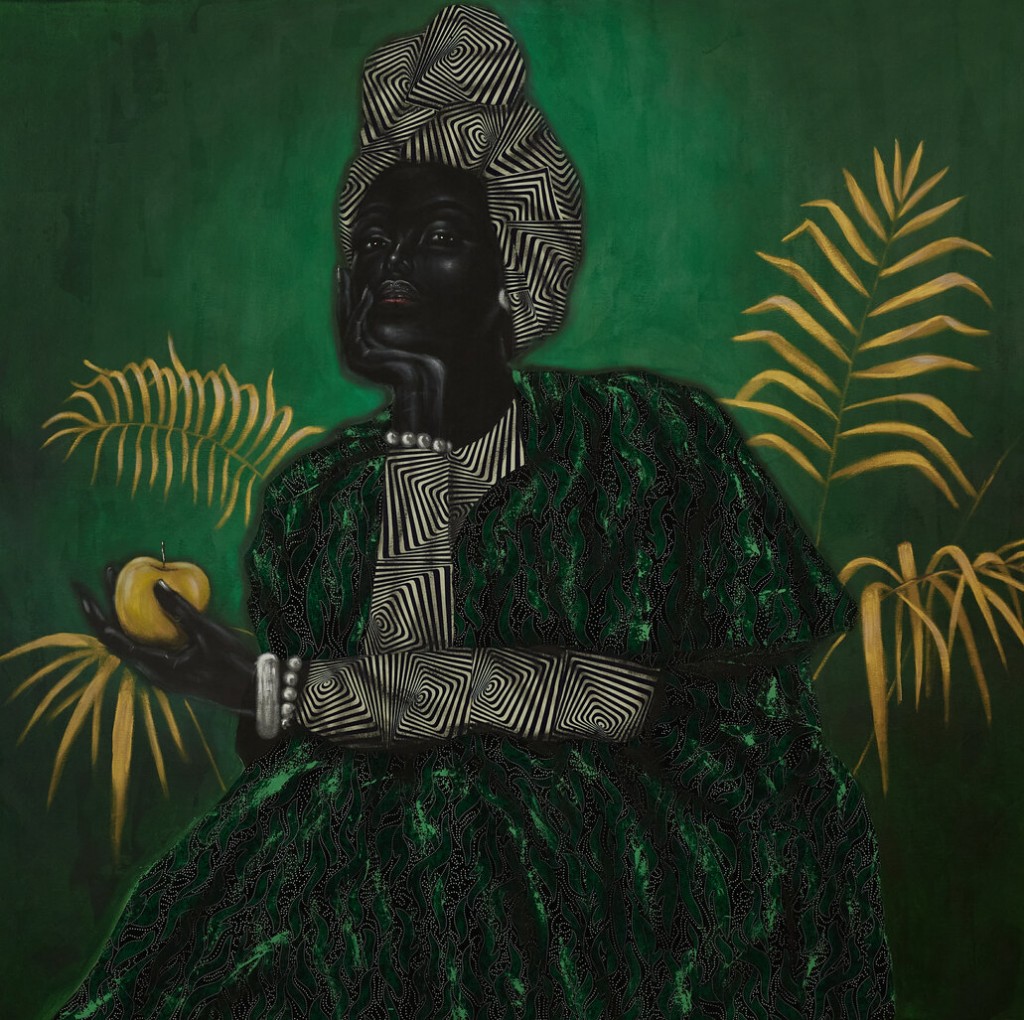
But getting to Sudan was just something amazing for me. You know, the places where people have experienced the most are the most kindest [sic] people. I cannot tell you how kind Sudanese are, how much love I received in Sudan. I cannot tell you how much. I have never experienced that kind of kindness (since), until now which is in Lagos, which has been such an amazing experience. You remind me so much of Sudanese, but also, you remind me so much of Africa, like everywhere in Africa we’ve got this kindness. But, that one was something else! And also here too. So the work was… the beauty of Blackness was just so undiluted.
So the inspiration is Sudan, the time I was in Sudan. It was so beautiful to see a Black skin, like the skin was just so beautiful and purely Black. Undiluted innocence. Like there was no one trying to be anything other than Black. And I thought “this is such a thing to be proud of, for us to talk about, like Blackness.” And so Blackness must be in someone’s face. I want that Blackness to be in someone’s face, like ok, this is Black, this is a Black person. And it is unapologetic. It’s just pure and it’s beautiful, and no one is doubting it. It’s just … you know (sucks in breath) confident and that’s what I wanted to go with.
A.L.M: I know you’ve been successful with everything you’ve done. But, I know you deal with doubts sometimes. When these self-doubts come, how do you deal with them?
RK: I think, first of all, I think where they come from is the moment I stop looking at where I need to go and I start looking all around me. I start to look at what other artists are doing, what all other people are doing, then all of a sudden, then mine is no longer good enough, or where I am is no longer good enough.
But how do I beat that is that I just refocus myself on where I need to be because then I look at where I’ve been. I look back and I’m like, how did I get there? Oh, I did a show in Berlin, I did a show in Paris. I did that [and] some of them were sold out, I did shows in Ethiopia that … and I am like actually, it is a good track record. And I think I’ve been blessed in that sense. And I stop looking elsewhere and I’m like whatever is coming again, it going to be beautiful. So I trust my journey, I trust my path, I trust where I’m going and I trust… yeah, I’ve got no doubts anymore[sic]. I have no doubts anymore [sic]. I mean, they do, it does creep in, but I always have to remind myself where I’ve come from, how far I’ve come.
A.L.M: Do you have a clear process (for your travels) or you allow your work or your guts to guide you? What is it like?
RK: I think the process is, I’m led by whatever it is, I think be it the spirit you’ll say or be it ehmm… and I allow it to just flow.

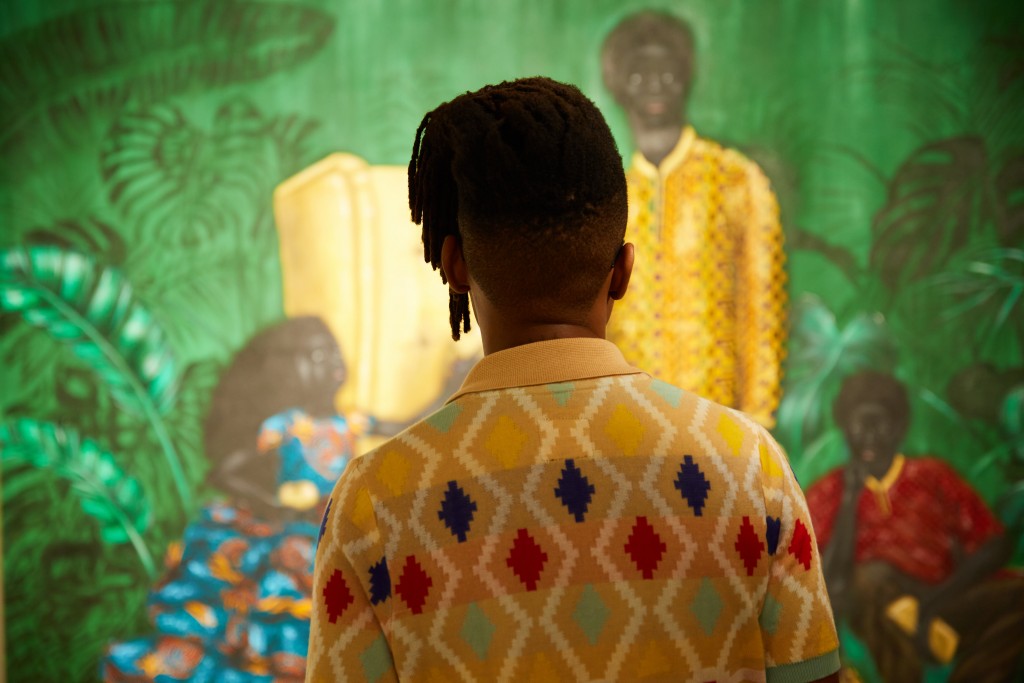
For instance, certain things like, sometimes what someone will find as negative, to me, like let’s say I need to go to London for a show or something, and all of a sudden the visas or whatever is a problem, I don’t fret anymore. I am not like, oh, I lost out because then I know that probably I was not meant to be there or it was not time yet but there’s something that is greater coming. And it usually is greater. So I’m trusting the process: I really trust the process fully.
I tell you, I was always in the bush with the motorbike for like, two good years literally travelling around in the bush. And I never slept hungry, I never.. and so on. And so, that taught me that I am well looked after, and my path in that sense is also unique and I trust … it’s almost God-given. So, I’ve got no doubt in that, in my path. I try to listen, I’m very sensitive to what is the next step, I’m very sensitive to the journey and where the work wants to go. Ehrmm, and sometimes, I just have to shut down and listen, and just listen. You know, I always say this, I always say to everyone: this is how people, we were, in terms of… the wind speaks, the ocean speaks, the land speaks but are we listening? You know, and these are some of the things I try to get in touch with, to get back to what… that sense that we once had as Africans to the land and to what is around us.
So, and I think that our souls also speak, but we shut down a lot of things. So then it will tell us, ‘this is where you’re going’ or ‘this is what you need to really be, this is where you need to be and this is what you need to…’ you know? And then, it will seem that whatever you do is not wrong, because you’re where you need to be.
And the art speaks too, you know, the art speaks. I have conversations with these paintings. Ehrm, I mean, as I’m painting I have conversations with them. That’s why you see the writing on them. So that’s the writing that I … it’s a conversation between myself and the work and the work and myself in a sense.
A.L.M: What has been your greatest challenge so far on your travels and in your art?
RK: Ehrrm, I think it’s trusting the process, that has been the hardest (not even when you were ill and you had to go back to South Africa?) I mean, that was painful but, I think it was for a reason.
The problem is that I’ve elevated myself to a point where my negativity is my positivity. Does it make sense? Like to a point where, ehrmm, like negativity… has got a part to play in my journey. So maybe if you’ve asked me this question then, I would have said ‘Ah, I felt bad then. But now, I look at everything as I’m on a journey, this is happening. There’s this thing that does not seem to work out now, but it is working out somehow, some way. You know.

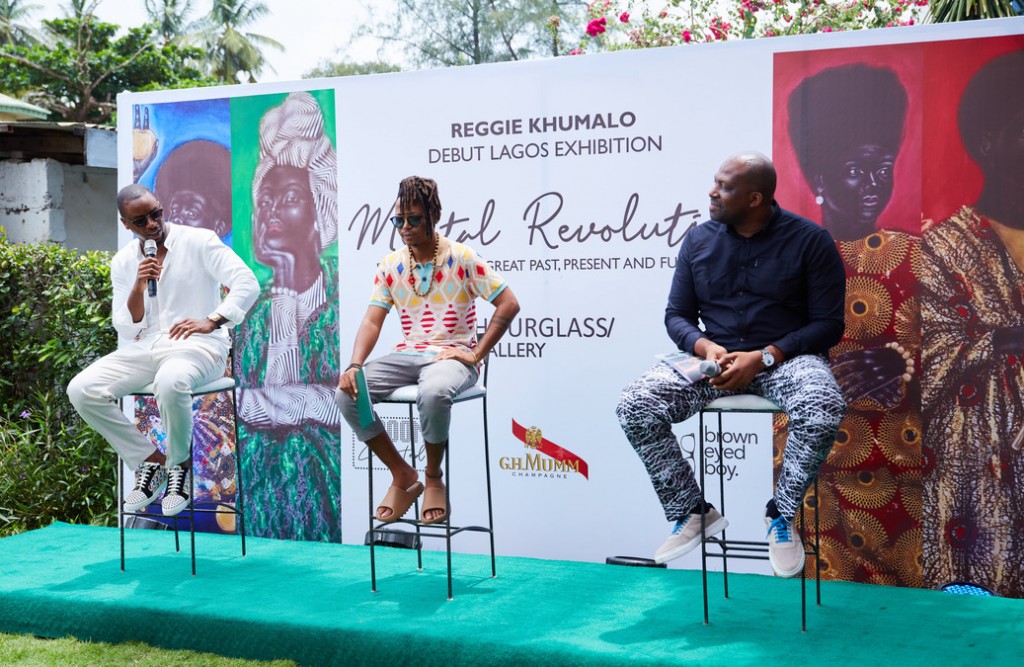
(Ok, so every challenge is just like an opportunity waiting…) I think every challenge is an opportunity. I think every, ehrr, you know, sometimes, even good things are bad, you know what I’m saying. So sometimes, what seems to be good for you is actually a poison. So, I don’t think there’s a bad and a good; I just think there’s now.
A.L.M: Is there something you’ll like to see more on the African art scene?
RK: I think what I want to see is more bravery, I think more bravery. I just want to see more guts. I just want to see more of us – not afraid to lose whatever little we have. I just want to see people being a bit more audacious, we must just go for it. Like, playing safe is not safe, you know? Like, I see we’re almost kind of doing the same things. Sometimes also, other artists start to buy into other people’s work and so on, and then you’re like ‘man, just do your thing, right?’
So, one thing that we need to do is also be adventurous. So, adventurous within yourself. Explore yourself, explore what you need to…. explore yourself, explore your soul, explore what’s around you, then, that tells… then you can be able to paint. Or you would be able to tell an art story from your soul
(But what about how we consume art? Because sometimes, it feels like we as Africans do not consume our art) I think, what needs to change is… like, this is why we are here, it’s called the Mental Revolution, innit? I think we need to change how we look at ourselves. That is all. The moment I feel confident in myself, the moment I feel confident in being Black, and that Black is also good, and Black is wealthy, Black is rich, Black is the top …of the pyramid scheme,… and then, you don’t even have to go out there [out of Africa] to buy a work.
I’ll tell you something: one way or another, I’ll have my say in this world, and then… be it through the work, be it through whatever. And then, the world will hear what we have to say. And I am not talking as Reggie, I am talking as African [sic]. I think that’s the thing for me: that as Africans we’re going to… we’ve got to a point where we’re telling our story unapologetically. And we need to believe in it.
A.L.M: What’s your view on NFTs? DO you ever think you’ll offer any of your work as an NFT?
RK: I think I will at one point… yes. Listen, I am a very strong believer in Ubuntu in terms of I am because you are, whatever the African philosophy. I am a strong believer in Africaness but also, I am not a fool not to realise where we are. We’re living in a capitalistic world. I think what we need to do is, sometimes, we need to wear our capitalistic hats, and then when we wear those hats, we deal as capitalists. But at home, we are Africans.
So, with the rest of the world, we need to deal as capitalists, but within ourselves, we still keep our strong sharing and kind heart and everything else. Because people cannot understand that outside of Africa.
So I’m going to get into NFTs one way or another at some point, maybe not now but I will get into it.

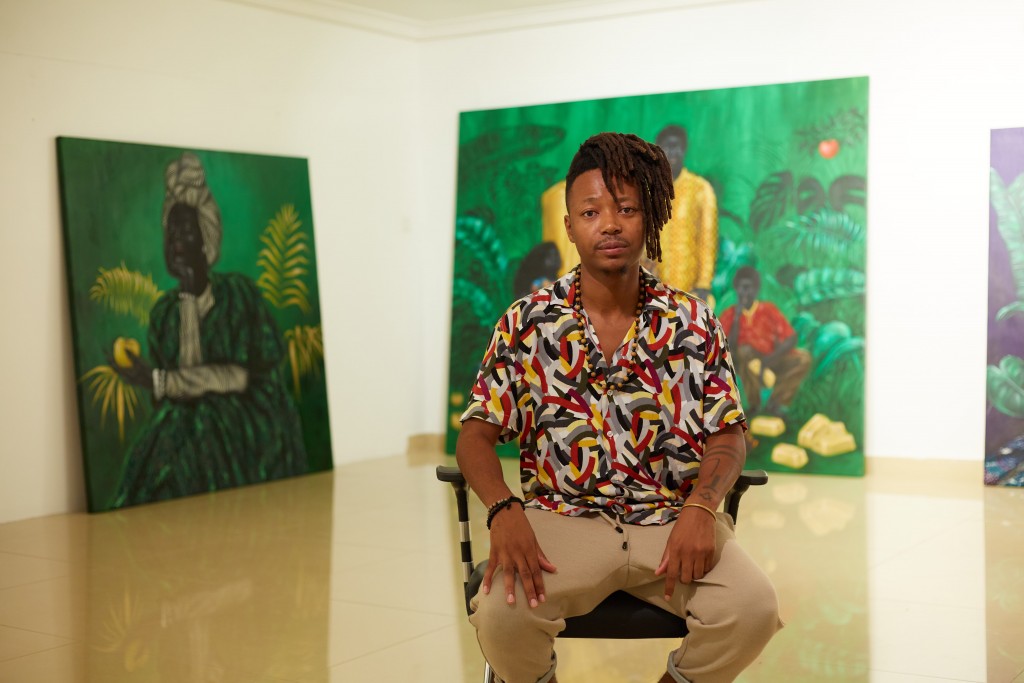
A.L.M: You lost one of your artworks recently. Have you been able to find it?
RK: They hijacked the truck (were you able to get it back?) No, I never got the painting back. It was being shipped to Atlanta in the States, and at the time in America, they had been robbing, ehrr, they had been hijacking courier cars… One of my paintings was in one of those trucks and they took everything, they took even my painting. So I never recovered that painting.
A.L.M: So, apart from your motorbike, and your tent, what are 3 things you cannot do without on your travels?
RK: Hmnn, well I think, toothbrush? I guess that’s important for all of us anyway. If we’re going to be talking here, I talk a lot, you know? So I need to be quite fresh – I hope I’m still fresh, but anyway (chuckles), toothbrush I get and ehrrm… So I have a lot of problems with my stomach, so of course, I need my meds, I guess, for my stomach. And then I…. I don’t know I never really… I never really thought about this. I guess… I guess a phone?
A.L.M: What are your top 3 African destinations?
RK: I think Egypt should be number 1 for every African, in terms of it should be the Mecca for us. Like we should do … pilgrimage. I think all Africans must go on a pilgrimage to Egypt. I think that is something we need to do. Because that tells a story of our past in a sense. And of course, it is not done by the Egyptians that you see now, I mean we all know that. And I think that’s a past… that’s a thing that when you come back from, you’ll be like ‘oh, actually, what happened? How did we lose it?’
Also Sudan, I think Sudan (South or) I mean general Sudan. Because ehmm … North Sudan I think, where the pyramids are. There is no doubt it was by Nubian farers, and then you realise that there are certain things that we knew.
And then, ehrr, I haven’t been to the West, so I’m looking forward… I want to leave the last spot to West Africa. That, I’m still yet to discover.
A.L.M: What are 3 things people don’t really know about you?
RK: Ehrrrmmm… there’s one thing that people don’t know… but I don’t know, ehmmmm…. I don’t know, ehmmmmm……I don’t know! I mean, if I don’t know, then….
The Mental Revolution by Reggie Khumalo is currently exhibiting at the HourGlass Gallery at Victoria Island, Lagos, and will end on the 20th of April 2022.
‘In Conversation with’ by ASPIRE Luxury Magazine celebrates stars, influencers, celebrities and public figures, shining a spotlight on their lives and the incredible stories they have to share.
